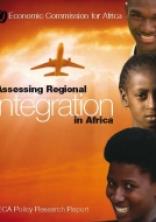Assessing Regional Integration in Africa I

African leaders now recognize more than ever the urgency of accelerating Africa’s integration, especially given the challenges of regionalism amid globalization. The World Trade Organization’s rules for the world trade system have heightened global competition and raised the stakes for Africa. This urgency is reflected in the establishment of the Commission of the African Union and the orientation of the units of the Commission.
To move the regional integration process forward, African countries have also adopted the New Partnership for Africa’s Development (NEPAD), the overarching development framework for the region, recognized by the United Nations and its agencies and such global bodies as the G-8 industrial countries.
Progress in African integration is mixed across sectors, regional economic communities, and member states. There have been some strides in trade, communications, macroeconomic policy, and transport. Some regional economic communities have made significant progress in trade liberalization and facilitation (The West African Economic and Monetary Union, or UEMOA, and the Common Market for Eastern and Southern Africa, or COMESA), in free movements of people (the Economic Community of West African States, or ECOWAS), in infrastructure (the Southern African Development Community, or SADC, and the East African Community, or EAC), and in peace and security (ECOWAS and SADC).Overall, however, there are substantial gaps between the goals and achievements of most regional economic communities, particularly in greater internal trade, macroeconomic convergence, production, and physical connectivity.